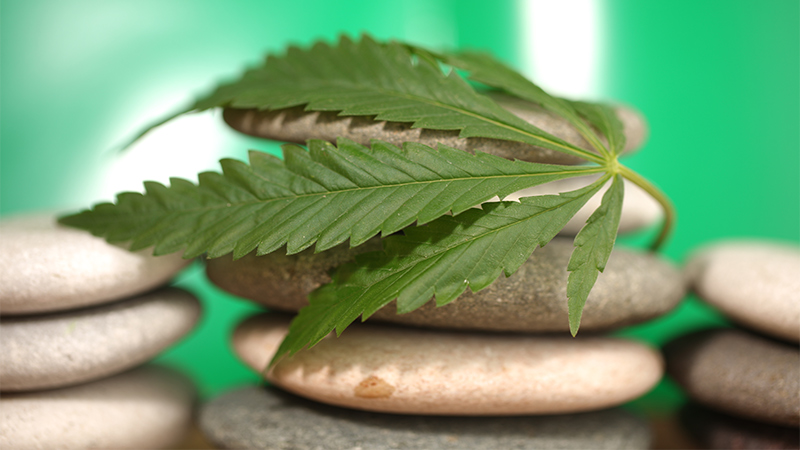CBD and Meditation: Benefits of Meditating with CBD

Sometimes, life can kick you pretty hard. With so many stimuli around us, it’s difficult to maintain a clear head if you don’t get enough sleep, nutrition, and physical activity.
Chances are, you have been suggested to practice meditation, which is a great way to put your mind into a state of balance and remain resistant to daily stressors. But did you know that adding CBD to your meditation routine can help you achieve even better results?
CBD and meditation is hot topic these days. Overworked professionals, athletes, travelers, busy parents — everyone can benefit from this combination.
The key to successful meditation is to calm the mind and relax the body at first so that you can focus inward, which is what CBD seems to do best.
In this article, we dive deep… no, not in ourselves. We dive deep into using CBD and meditation together to take care of your mental well-being. We’ll cover the basics about meditation, how CBD may help, and how to use CBD oil to maximize the benefits.
What Is Meditation?

When most people try to picture meditation, they usually see a yoga master sitting on a cushion in a Shiva-like position, trying to ooom the heck out of himself. But the truth is, real meditation is far from that.
Meditation is a mental practice to put a person into a state of focus, relaxation, and awareness. From a metaphysical standpoint, it’s a tool to transform the mind and become enlightened.
Meditation occurs in every culture over the world, dating back to millennia. Most religions, including Judaism, Hinduism, Buddhism, Christianity, and even Islam, have some sort of meditative regime. And while meditation is rooted in spiritual practices, most people today use it to relieve stress and unwire the mind from the aforementioned stimuli.
Types of Meditation
There are three main types of meditation: mindfulness, transcendental, and guided meditation.
Mindfulness Meditation
Mindfulness is a concept that encourages being completely present at the moment with your thoughts. The purpose of this type of meditation is to become aware of what you are feeling and doing as you sit and breathe — to let the thoughts flow through your head without triggering any reactions.
If you get distracted by external noise or get caught up in the “chatter” in your head, mindfulness will recalibrate your attention to the moment, focusing on even, deep, rhythmic breathing.
Although you can practice mindful meditation virtually anywhere by simply staying in the moment, the best conditions to meditate this way are while sitting or relaxing in a quiet room with eyes closed, where you can control your breath.
Transcendental Meditation
Transcendental meditation involves using a mantra, which is a sound, word, or short phrase that is repeated — in silence or out loud — to keep the distractors away. Most people practice it twice a day, seated in a relaxed position, with their eyes closed. The mantra makes it easier to enter an introspection and quiet the mind while keeping the stress at bay, resulting in a deep state of relaxation.
Guided Meditation
Guided meditation uses stories, situations, mental images, or visualizations to relax and make you feel focused. For example, imagine you’re sitting in a pine forest, listening to birds and feeling the wind slowly touching your cheeks. This type of meditation is often conducted by a mentor — during a live or recorded session — and spurs you to use all of your senses as you try to imagine the scene, including views, sound, touch, and smell.
Meditation and Stress
Before you ditch the idea of meditation because you consider it too “alternative,” think about it this way: even modern science agrees that by meditating 10 minutes a day, a person can help increase their ability to relax while reducing stress, anxiety, and even regulating blood pressure.
The Link Between Meditation and Stress
Meditation is exactly the opposite of stress. It can trigger and boost our relaxation response, helping the body achieve homeostasis. This not only relaxes our minds and helps us focus, but it brings back the so much needed balance in the body, allowing our systems and organs to effectively maintain their function and repair from the physical damage caused by stress.
How Meditation Can Help Reduce Stress
If you’ve heard of the “fight or flight” response, you know that our bodies can be put in a state of alertness at the first signs of threat. While that threat may no longer be a predator watching you as their prey, our daily lives are chock-full of stressors that keep us constantly alert, even if we think there’s nothing to worry about.
These days, our minds race, and our bodies are overwhelmed by stress, pains, and tension.
Consistency in meditating not only helps us stave off the state of permanent stress and find a way to calm down, but it also helps us become less reactive and calmer on a daily basis. Meditation also facilitates positive thinking and makes us more adaptable and resilient.
CBD and Meditation: What You Need to Know

CBD and meditation go hand-in-hand. CBD has a myriad of positive effects on our body and brain, all of which can improve your meditation routine. So, if you’re wondering if CBD can help you meditate, then the answer is a straight “yes.”
Your body naturally produces a neurotransmitter called anandamide. It works “on demand,” meaning that your body doesn’t constantly produce it, nor does it store the compound for later.
Scientists have linked higher levels of anandamide with increased happiness and reduced cortisol, keeping the flight-or-flight response in check. This neurotransmitter belongs to a class of compounds known as endocannabinoids; they’re an essential part of the endocannabinoid system (ECS) which works constantly to promote a state of balance to the body and mind.
When you’re constantly stressed, your body may become deficient in endocannabinoids. In fact, clinical endocannabinoid deficiency is proposed as the underlying cause of many autoimmune diseases as well as psychiatric disorders.
When you take CBD, it signals the ECS to produce more anandamide; it also inhibits an enzyme that breaks it down, making it more available for the body.
As a result, you can return to homeostasis more efficiently, especially if you combine CBD supplementation with meditation. When you’re in the state of flow — which is what meditation does to your mind — your body naturally produces higher levels of anandamide.
That’s what makes this combo so effective.
Increased Ability to Focus
This is paramount, especially if you’re just getting started with meditation and wish to extend your practice time. CBD oil has been shown to improve concentration by acting on GABA receptors, calming an overactive nervous system. This, in turn, allows you to remain in the zone for longer and resist random thoughts that would otherwise cause you to fall out of that balance.
Reduced Stress and Anxiety
If your mind is full of worrisome thoughts and anxiety, you’ll have a hard time trying to sit still and enjoy 10 minutes of undisturbed silence. Studies are showing that using CBD oil for anxiety can directly lower blood pressure and thus facilitate slower breathing. This, in turn, stimulates your parasympathetic system, which is responsible for feelings of calm and relaxation.
Stabilized Mood
Meditation is all about improving your mood by achieving a state of balance between the body and mind. CBD oil helps you stay calm and improves the production of serotonin in the brain. This, in turn, elevates your mood and helps you maintain longer meditation periods. Like everything else, meditation is a skill that takes time and practice to master — and the more you practice, the better your mindfulness meditation will get.
Reduced Pain
If you live with a disability, chronic pain, or an inflammatory condition, high-quality CBD oil for pain can help you ease the physical discomfort by reducing inflammation and mitigating pain transmission from the neurons to the brain. Yoga and meditation can have short-term and long-term benefits for conditions involving chronic pain. CBD, on the other hand, can help relax tense muscles and reduce soreness, improving your range of motion and the ability to sit still for a while.
Types of CBD Products for Meditation
Ready to combine your meditation mantra with CBD supplementation? Here are a few great options if you’re looking for everyday support:
- CBD oil is a hemp extract suspended in a natural carrier oil for better absorption and even distribution. It’s taken under the tongue using a dropper; it’s one of the most effective ways to take CBD and a great way to start your day before meditating.
- CBD capsules offer a fixed dose of CBD in a convenient softgel form that you can add to your morning vitamin routine.
- CBD gummies are probably the most enjoyable way to take your daily CBD. You can take them anytime and anywhere you want for an extra CBD boost. They have a delayed onset (similar to capsules), so make sure to wait for about 40 minutes before you start meditation.
- CBD vapes come in handy when you’re looking for almost instantaneous effects. Vaporized CBD starts to act within minutes after inhalation because it uses the lung tissue for absorption. It’s also the most bioavailable of all consumption methods.
- CBD topicals can help you ease localized discomfort, such as soreness, itching, pain, and swelling caused by inflammation. If you have a chronic pain condition, using CBD creams for pain before meditation can help a lot.
How to Use CBD Oil for Meditation

- Take CBD under the tongue before meditation practice. Measure out the desired dose of CBD with the dropper and transfer it under your tongue, holding for up to 60 seconds before swallowing. From there, the oil will absorb through the tiny capillaries beneath the tongue, avoiding the liver and the first-pass metabolism.
- Add CBD oil to your morning tea. You can actually use any kind of beverage that you drink in the morning, be it coffee, tea, fruit juice, or smoothies. If you mix CBD oil into your tea, you can sip it slowly during your meditation practice.
- Use CBD in skincare. As mentioned above, CBD creams and lotions offer relief for localized problems and are a great way to relax your body before meditation.
Tips on Using CBD Oil to Boost Meditation
CBD and meditation can significantly improve your well-being if you’re consistent with your routine. However, keep in mind that these are just tools for balancing your body — not quick fixes or magic pills that will do wonders to your health overnight.
Here are three things you need to know about before practicing CBD and meditation.
Results May Vary Between Individuals
This is true for all things in life, and CBD is no exception. Although the current body of scientific research on the health benefits of CBD oil looks impressive, the vast majority of studies were conducted on small samples or animal models. There’s also a plethora of anecdotal evidence from CBD users claiming that CBD oil and meditation helped them alleviate certain conditions. But the truth is, results vary depending on a person. Some find that CBD helps them get rid of anxiety before work, while others use it to induce focus and creativity. There are also people who claim that CBD simply makes them drowsy. You’ll need to try different doses at different times of the day to figure out how CBD affects you.
It Takes Time
CBD is a complex compound, so you may not see the results from the start. It has an interesting way of working with the endocannabinoid system; the more you take, the more receptive your body will become to it. This phenomenon is known as reverse tolerance. Depending on your levels of endocannabinoids and the scale of deficiencies, you might need anywhere from two weeks to a couple of months of continuous CBD use in order to experience its benefits.
CBD Won’t Do Wonders for Your Meditation
CBD won’t turn you into a meditating rock — that’s wishful thinking. Meditation is a process that takes time and effort, especially if you’ve never meditated before. Although CBD can help you enter a more relaxed and stable state, it doesn’t mean it will magically make you the master of meditation. Instead, consider looking for different guided meditation apps and videos, and being regular with your sessions.
Key Takeaways on Combining CBD with Meditation
Modern life puts us into all kinds of discomfort. Physical and mental fatigue can be difficult to overcome if you don’t find the right solution to maintain the balance between the body and mind. Whether you live an active lifestyle or sit at a desk all day hunched over a keyboard, meditation can help you relieve tension and soreness, putting you into a state of deep relaxation.
Not only that, but meditation also relieves stress and anxiety by regulating your breath and improving awareness while keeping anxious thoughts at bay. It’s no wonder why so many people become interested in this practice.
You can boost your wellness care in many ways, but when it comes to meditation, CBD is a perfect partner. By interacting with your endocannabinoid system, CBD can reduce pain, relieve stress, ease anxiety, dampen inflammation, and elevate your mood with consistent use.
This, in turn, provides complimentary benefits for those who meditate in the morning or before bed.
Do you use CBD for meditation? Share your experience in the comments below!